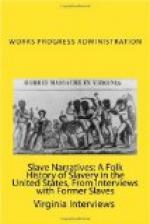The slaves would have their parties and dances. Slaves would gather from various plantations and these parties would sometimes last all night. It was customary for the slaves to get passes from their masters permitting them to attend, but sometimes passes were not given for reasons. In line with these parties it is remembered that there existed at that time what was known as the Paddle-Rollers, these so called Paddy-Rollers was made up of a bunch of white boys who would sneak up on these defenseless negroes unawares late in the night and demand that all show their passes. Those that could not show passes were whipped, both the negro boys and girls alike. The loyalty of these poor black boys was shown when they would volunteer to take an extra flogging to protect their girl friends. The Paddy-Rollers were a mean bunch of white boys who reviled in this shameful practice.
After slavery was abolished, this colored slave family remained on the same plantation for one year. They left the plantation via Cloverport by boat for Evansville, Ind., where they remained until the subject of this sketch removed to Franklin, Ind. in 1903 where he took pastorate with the African Methodist Episcopal Church where he served for 12 years. He is now a retired minister residing at 427 W. King St.
Federal Writers’ Project
of the W.P.A.
District #6
Marion County
Anna Pritchett
1200 Kentucky Avenue
Folklore
Mrs. America Morgan—ex-slave
816 Camp Street
America Morgan was born in a log house, daubed with dirt, in Ballard County, Kentucky, in 1852, the daughter of Manda and Jordon Rudd. She remembers very clearly the happenings of her early life.
Her mother, Manda Rudd, was owned by Clark Rudd, and the “devil has sure got him.”
Her father was owned by Mr. Willingham, who was very kind to his slaves. Jordon became a Rudd, because he was married to Manda on the Rudd plantation.
There were six children in the family, and all went well until the death of the mother; Clark Rudd whipped her to death when America was five years old.
Six little children were left motherless to face a “frowning world.”
America was given to her master’s daughter, Miss Meda, to wait on her, as her personal property. She lived with her for one year, then was sold for $600.00 to Mr. and Mrs. Utterback stayed with them until the end of the Civil war.
The new mistress was not so kind. Miss Meda, who knew her reputation, told her if she abused America, she would come for her, and she would loose the $600.00 she had paid for her. Therefore, America was treated very kindly.
Aunt Catherine, who looked after all the children on the plantation, was very unruly, no one could whip her. Once America was sent for two men to come and tie Aunt Catherine. She fought so hard, it was as much as the men could do to tie her. They tied her hands, then hung her to the joist and lashed her with a cow hide. It “was awful to hear her screams.”




